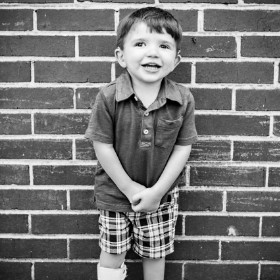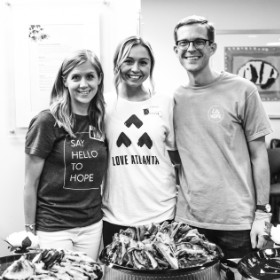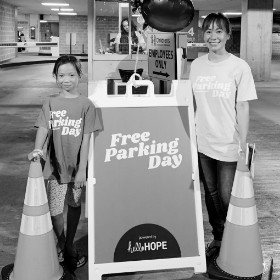Biliary Atresia and Liver Transplant: Corrie's Story of Hope
Corrie’s life is marked by hope that is grounded in the faith of her parents, Clay and Paige, and the gift of life given to her through a liver transplant. Hers is a beautiful story, and it is an honor to share it with you today.
The Weight of the Diagnosis: Biliary Atresia
The youngest of four children, Corrie was born full term, completely healthy, and was a joy to her family. At her eight-week check-up, the pediatrician remarked that she was too jaundiced for her age, and since they lived in Florida and were often in the sun, Paige wasn’t concerned when the doctor ordered blood work for little Corrie. Paige did become alarmed, however, when the doctor called her immediately after receiving the test results and asked them to come back into the office right away.
The pediatrician informed them that Corrie’s blood work pointed to a diagnosis of Biliary Atresia, a rare and serious liver disease, and Corrie was admitted to the hospital the next day. Biliary Atresia, a liver disease found only in infants, occurs when the bile ducts become inflamed and blocked. Without proper draining, the toxins in the bile build up in the liver, cause scarring, or cirrhosis of the liver.
Enduring the Kasai Procedure and Uncovering Corrie’s Prognosis
Upon Corrie’s arrival at the hospital, a series of tests were run to determine her level of health and the appropriate next steps. Within a week of being admitted, she had a surgery called the Kasai Procedure. This seven-hour surgery replaces the blocked bile ducts outside the liver with a length of the baby’s own intestine, which acts as a new drain. The surgery was a temporary fix, and Paige and Clay were told that Corrie would likely need a liver transplant one day. The weight of her diagnosis hit them with full force.
Paige recalls, “The words ‘liver transplant’ scared us tremendously at first. The thought of something that major taking place in our life was more than we thought we could handle. When you get a serious health diagnosis for one of your children, you are never quite prepared for all it will entail, and the ‘what ifs’ can terrify you. Life was already full with the normal everyday things of having four kids and homeschooling, so to throw a medical crisis into the mix was frightening and stressful.”
Adjusting Family Life to the New Normal
When Corrie came home from the hospital following the Kasai Procedure, her family adjusted to a new schedule that included regular lab work, doctor visits eight hours away at the liver specialist in Atlanta, and managing multiple medications. As a tight-knit family, Paige and Clay quickly realized that Corrie’s disease and eventual need for a liver transplant was going to affect more than just Corrie and themselves; it was going to affect Corrie’s siblings, too. Since there would be times when they would need to be cared for by family or friends, Paige made a point to include their other children in the process as much as possible. She reflected, “I never wanted my older ones to think that Corrie matters more than they matter. They are just as important in my heart, and their football, gymnastics, and other activities matter to us, too.” They came along for doctor appointments and blood draws, and they learned by watching their mom sterilize the items needed for Corrie’s at-home IV antibiotics. Their family, in the midst of these difficult days, looked for ways to connect and grow together.
Corrie responded well for the first year after the Kasai Procedure, but shortly after her first birthday, her body showed warning signs of further liver deterioration. Roughly every four to eight weeks, Corrie would end up in the hospital being treated for a high fever –– sometimes for a few days, and in some cases, weeks at a time. The fevers and degrading liver function were taking their toll on little Corrie, and on one of these hospital stays she became septic. Paige remembers the time vividly and recalled with gratitude, “We almost lost her then, but God spared her life again and pulled her through that episode.”
As hospital stays became more frequent, Paige and Clay’s nerves began to wear thin. Pulled apart in different directions as they sought to care for their four children, it was a stress-filled time. Their community was instrumental in holding them up in prayer and helping them in practical ways, but Paige also credits their survival to God’s faithfulness. Paige remembered, “One of the biggest things I realized was that I was entering a new spiritual battlefield. I needed to remember that the Lord was already there roaring back at the enemy on behalf of me and on behalf of Corrie. I didn’t have to do this battle alone. The Lord was already there.”
As the disease took its toll on the family, Paige recalls how there were so many small moments that kept them going, holding onto hope. Thinking back to those moments of God’s faithfulness, Paige shared with us how, “[He] always put someone new across my path to encourage us at the right time.”
The Liver Transplant Arrives
Two more back-to-back stays came at their local Tampa hospital, and Corrie’s fragile health pushed the team at Children’s Healthcare of Atlanta to airlift her to Atlanta for closer observation. Their suspicions were confirmed, and Corrie’s doctors placed her on the United Network of Organ Sharing (UNOS) list for a new liver.
They were sent home to wait for the new liver. Just two weeks after Corrie’s second birthday, she and Paige made the trek up to Atlanta for her liver clinic. The night before their appointment, they received “the call.” A liver donor match for Corrie had come.
Clay and the rest of the family immediately drove up from Tampa to see Corrie before she went back for the seven-hour transplant surgery. They grappled with the bitter-sweet reality that the transplant day had come. Paige remembered the emotions of the morning as they sent Corrie back for the procedure, “Knowing that a mom and dad had lost their precious baby so that mine can live was extremely hard. My heart was grieving for the loss of another child, and yet excited that my child had the opportunity to live. It’s almost too much to wrap your mind around and too much to handle. As I handed Corrie over to the surgeon, I had to release her into the hands of God.”
Corrie came out of the surgery wonderfully. When she first woke up after the surgery, she was able to see her siblings, which was a huge celebration for everyone. The whole family had invested so much into Corrie’s journey, and they were overjoyed to see her on the road to recovery. With the help of her medical team and her family, she was able to go home one month to the day after surgery.
Life After the Liver Transplant
While Corrie was a happy baby and toddler before the transplant, Paige commented on her transformation after the procedure, saying, “She came to life afterwards. She had a lot more things to say and places to go and people to meet.” At four years old now, Corrie is full of joy. She’s busy, has never met a stranger, and is excited about life. Paige added, “If it wasn’t for her scarred belly, I wouldn’t know she had been through all that she has.”
Today, Corrie and her family are adjusting to another new normal. She is down from the 8 different medications she was previously taking to just one medication: an anti-rejection drug that she will take for the rest of her life.
God continues to use their circumstances –– even the anti-rejection drug –– to draw them to His fatherly heart. Paige shared this touching insight: “We have to take our anti-rejection medication every day by staying in God’s word. If I don’t start the day in God’s word, then a spirit of rejection can come on me, and I have to continually renew my mind. Daily I need to meditate on God’s word so that I live and thrive and survive. What we need for our hearts is the same thing Corrie needs each day for her body.”
Another part of re-acclimating to life after the liver transplant meant taking time to evaluate their family’s needs. Paige and Clay realized that after being pulled in so many directions over the course of several months, they needed to take steps toward reconnecting as a family. They moved to a new town that puts them closer to the hospital for Corrie’s check-ups and allows for a slower pace of life. Paige shared, “It has been so much more peaceful on the other side of transplant, and God is continuing to heal and restore our family to a new normal –– a better normal.”
A Word for Other Families Facing an Organ Transplant
Paige concluded our time with these words of encouragement for other families facing an organ transplant or medical adversity:
“As many parents facing a medical crisis know, the journey is scary and there are so many details and unknowns involved. For our family, knowing that the Lord had already gone before us and made a way for us to get to the other side was a huge comfort. It was not always easy to trust His leading, but as we stayed close to Him, He made our path straight and brought so many fellow travelers along our journey to guide us to the other side.
I wanted to share Corrie’s story to give hope to other families facing any medical crisis and especially an organ transplant. There really is a great life to be had after the transplant, and it is more normal than I ever imagined. This experience has taught me to trust God more with my children, to share my highs and lows with my friends, family, and community, and to not be afraid to ask for prayer and support during our low points. It has taught me to let people help and then to pass the hope we were given on to others. While I would never wish this upon any family, the lessons we learned and the connections we have made are priceless. Every heartache we experienced was worth enduring for the hope we now have to give away.”
The faith that Corrie and her family have carried through their medical journey is contagious and filled with the hope that a brighter tomorrow is waiting for each of us. We are so thankful to them for sharing their story with us!
Loading...

















